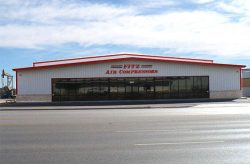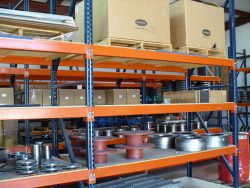How to Choose The Right Industrial Air Compressor
Choosing an industrial air compressor is a big investment, but it’s not always clear where to start. From sizes, functions, motors to types of industrial air compressors, there’s a lot to consider. Before committing to a new system or unit, make sure you’re asking the right questions.
Using our guide, you can establish your needs and get the right units, parts, and tools. Whether you’re a new company, or an extant business looking for an upgrade, we’re here to help. Don’t settle for anything less than the perfect fit for you.
Types of Compressors
There are several industrial air compressor types to suit your needs, from axial compressors (high-volume, multi-stage design) to scroll compressors (oil-free, limited capacity). Our guide helps you determine which compressor type suits your exact expectations.
Also, consider if your compressor should be oil-free or lubricated. Oil-free options utilize Teflon for permanent lubrication. Oiled or lubricated air compressors require regular addition and replacement of oil as necessary. While oil-free options are cheaper and require less maintenance, once the Teflon wears out, entire parts will need replacing. Oiled compressors are far more durable.
Key Features to Look For
No matter what, you should always look for “compressor keystones” that should be present on all units. Investing in quality up-front saves you a headache down the road, so don’t get caught without the essentials. Before investing in an industrial air compressor, look for the following key features:
- Thermal Protection: Air compressors generate a lot of heat from friction between internal parts. A thermal protection system cuts power when the machine gets too hot. This prevents damage to the unit and ensures user safety.
- Air Filter: Filters preserve your machine and increase its longevity. When debris is a factor, an air filter prevents contaminants from getting into the machine and causing problems.
- Drain Valve: Air contains some level of moisture, which collects inside the tank over time. Since tank interiors are not typically coated, this leads to rapid corrosion. Ensuring your tanks have a way to drain excess moisture keeps them from rusting, saving you repair and replacement costs.
- Pressure Switch: Take the guesswork out of operating your machine, and ensure it’s always ready to go. A pressure switch turns the machine on and off as necessary to maintain the pressure that you determine beforehand.
How to Choose an Air Compressor
The first step to choosing a new industrial air compressor is determining your specific needs. If you have a unit already, consider what you like and don’t like about it. In what ways does it work, and in what ways does it fall short? Knowing how to choose an air compressor that’s best for you involves determining the main purpose it will serve.
What Purpose Will Your Air Compressor Serve?
From field and farm to the factory floor, air compressors do heavy lifting across all industries.
The big question, “what does my air compressor need to do?” seems obvious, but answering this question accurately uncovers and troubleshoots problems from the get-go. If your current unit isn’t cutting it anymore, or if you’re a first-time buyer, establishing the machine’s purpose allows you to ask and answer these questions:
- What Size do I Need? Calculate the amount of CFM (cubic feet per minute) following these simple steps to determine your usage and required capacity. When selecting, go by SCFM (standard cubic feet per minute), and err on the side of “too much” rather than “too little.”
- Should My Unit be Portable? There are great portable units out there, and they do have their uses – mining, rail and road work, etc. – but they aren’t for everyone. Stationary units are more powerful, but can’t go where portable units go.
- What Style of Compressor Should I Get? Industrial air compressors come in single-stage or two-stage. Depending on your needs (up to 150 psi) a single-stage compressor will work; higher pressures require a two-stage compressor.
What Drive System Is Best?
Determining what drive system is going to be most reliable and beneficial to your business comes down to location.
- Electric: Electric air compressors are inexpensive to run and easy to maintain, making them ideal – but only if a constant supply of power is available.
- Diesel: This is your go-to when job sites are remote or varied and a plug isn’t always an option. Diesel compressors cost more to operate, but when they’re necessary to get jobs done, it’s money well-spent.
What Materials Are Available?
When you’re working with compressed air in demanding environments, the strength and durability of materials in the industrial air compressor are essential factors to look out for.
- Tank Material: Tanks are usually made of steel. They’re inexpensive and durable, and there’s no better option out there. As for exterior paints and finishes, consider where your tank will be stored and if debris or moisture is a factor in the environment.
- Compressor Material: This can be made out of either aluminum or cast iron. Cast iron is durable and has extremely high compressive strength – but its rigidity makes it brittle. Aluminum is low density, high strength, and malleable. Aluminum will likely be the best choice for most applications, but cast iron does have its uses.
Inspect belts, motors, valves, bearings, and gears on your prospective air compressor. Look for durable, industry-standard materials and parts, ensuring your machine is safe to use, resistant to corrosion, and that these parts can be easily replaced when necessary.
Fitz Equipment Industrial Air Compressor Options
Fitz Equipment offers a wide variety of trusted air compressor brands and types to suit your needs. We are a Gardner Denver authorized distributor and can offer brand-new and remanufactured units. Our knowledgeable, friendly team helps establish your needs and fulfill them quickly – meaning less downtime for you.
Fitz Equipment boasts a state-of-the-art remanufacturing facility that’s the best in Texas and the surrounding states. We also offer parts, competitive warranties, and 24-hour on-call repair service. We’re there for you every step of the way.
Before making your next air compressor purchase, reach out to Fitz Equipment – let our 100 years combined experience and 24/7 service make choosing an air compressor simple for you.




